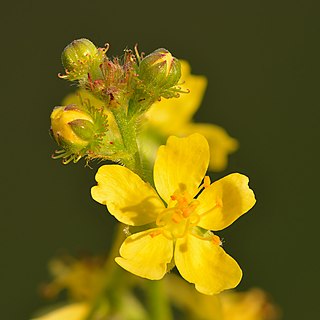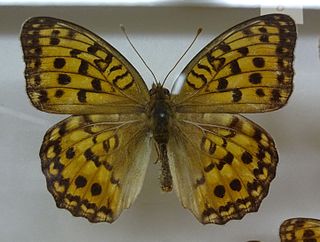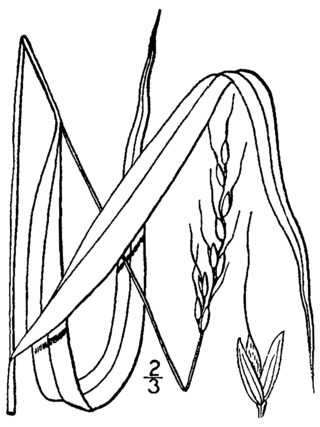
Stipa is a genus of around 300 large perennial hermaphroditic grasses collectively known as feather grass, needle grass, and spear grass. They are placed in the subfamily Pooideae and the tribe Stipeae, which also contains many species formerly assigned to Stipa, which have since been reclassified into new genera.

Agrimonia, commonly known as agrimony, is a genus of 12–15 species of perennial herbaceous flowering plants in the family Rosaceae, native to the temperate regions of the Northern Hemisphere, with one species also in Africa. The species grow to between 0.5–2 m (1.6–6.6 ft) tall, with interrupted pinnate leaves, and tiny yellow flowers borne on a single spike.

Symplocos is a genus of flowering plants in the order Ericales. It contains about 300 species distributed in Asia and the Americas. Many species grow in humid tropical regions. This is sometimes considered to be the only genus in family Symplocaceae. Plants in this family are shrubs and trees with white or yellow flowers. The oldest fossils of the genus date to the lower Eocene of Europe and North America, with the genus being present in Europe as late as the Pliocene. Fossil seeds of †Symplocos granulosa are frequent in sediment rock layers of the Late Oligocene to the Late Miocene of Denmark, Germany, Austria and Poland. The fossil seeds are very similar to the seeds of the extan southern Chinese species Symplocos glandulifera and Symplocos sulcata. Fossil seeds of †Symplocos paucicostata are known from the Middle Pliocene sediment rock layers in Reuver, the Netherlands and from the Late Pliocene sediment rock layers in northern Italy. The fossil seeds are very similar to the seeds of the extant East Asian species Symplocos paniculata

Araniella is a genus of orb-weaver spiders first described by R. V. Chamberlin & Wilton Ivie in 1942. The genus includes Araniella cucurbitina, the cucumber green spider.

Evarcha is a genus of spiders in the family Salticidae with 85 species distributed across the world.

Nipponopsalididae is a family of harvestmen with three described species in one genus, Nipponopsalis, which is found in East Asia.

Neottia is a genus of orchids. The genus now includes the former genus Listera, commonly known as twayblades referring to the single pair of opposite leaves at the base of the flowering stem. The genus is native to temperate, subarctic and arctic regions across most of Europe, northern Asia, and North America, with a few species extending into subtropical regions in the Mediterranean, Indochina, the southeastern United States, etc.

Ramalina is a genus of greenish fruticose lichens that grow in the form of flattened, strap-like branches. Members of the genus are commonly called strap lichens or cartilage lichens. Apothecia are lecanorine.

The Korean brown frog is a species of frog in the genus Rana. It is native to the Korean Peninsula and Shandong, China.

Semisulcospira is a genus of freshwater snails with an operculum, an aquatic gastropod mollusks in the family Semisulcospiridae.

Luehdorfia puziloi is a butterfly of the family Papilionidae. It was described by Nikolay Grigoryevich Erschoff in 1872. It is found in Manchuria, the Russian Far East (Ussuri), North Korea, South Korea, Japan and the Kuriles.

Mosla is a genus of plants in the family Lamiaceae, first described as a genus in 1875. It is native to eastern Asia, the Himalayas, and southeastern Asia.
- Mosla bracteataDoan ex Suddee & A.J.Paton - Vietnam
- Mosla cavalerieiH.Lév.- Vietnam, Guangdong, Guangxi, Guizhou, Hubei, Jiangxi, Sichuan, Yunnan, Zhejiang
- Mosla chinensisMaxim. - Vietnam, Korea, Japan, Anhui, Fujian, Guangdong, Guangxi, Guizhou, Hubei, Hunan, Jiangsu, Jiangxi, Shandong, Sichuan, Taiwan, Zhejiang
- Mosla coreanaH.Lév. - Korea
- Mosla dianthera(Buch.-Ham. ex Roxb.) Maxim. - China, Japan, Korea, Ryukyu Islands, Kuril Islands, Primorye, Caucasus, Himalayas, Myanmar, Vietnam, Philippines, Sumatra
- Mosla exfoliata(C.Y.Wu) C.Y.Wu & H.W.Li - Sichuan
- Mosla hangchouensisMatsuda - Zhejiang
- Mosla japonica(Benth. ex Oliv.) Maxim. - Japan, Korea, Ryukyu Islands
- Mosla longibracteata(C.Y.Wu & S.J.Hsuan) C.Y.Wu & H.W.Li - Guangxi, Zhejiang
- Mosla longispica(C.Y.Wu) C.Y.Wu & H.W.Li - Jiangxi
- Mosla pauciflora(C.Y.Wu) C.Y.Wu & H.W.Li - Guizhou, Hubei, Sichuan
- Mosla punctulataNakai - Korea, Taiwan, Japan, China
- Mosla scabra(Thunb.) C.Y.Wu & H.W.Li - Vietnam, Korea, Japan, Ryukyu Islands, Anhui, Fujian, Gansu, Guangdong, Guangxi, Henan, Hubei, Hunan, Jiangsu, Jiangxi, Liaoning, Shaanxi, Sichuan, Taiwan, Zhejiang
- Mosla soochouensisMatsuda - Anhui, Jiangsu, Jiangxi, Zhejiang
- Mosla tamdaoensisPhuong - Vietnam

Metagonimus yokogawai, or the Yokogawa fluke, is a species of a trematode, or fluke worm, in the family Heterophyidae.

Fabriciana nerippe is an East Palearctic butterfly in the family Nymphalidae (Heliconiinae). It is found in Japan, Korea, China, and Tibet.

Coscinida is a genus of comb-footed spiders that was first described by Eugène Louis Simon in 1895.

Allomengea is a genus of dwarf spiders that was first described by Embrik Strand in 1912.
Nippononeta is a genus of Asian dwarf spiders that was first described by K. Y. Eskov in 1992.
Fabriciana nerippe coreana is a butterfly found in the East Palearctic that belongs to the Nymphalidae family.

Patis is a genus of grasses in the Stipeae tribe of the grass family, found in China, Korea, Japan, eastern Canada, and north central and eastern United States.
This page is based on this
Wikipedia article Text is available under the
CC BY-SA 4.0 license; additional terms may apply.
Images, videos and audio are available under their respective licenses.

















